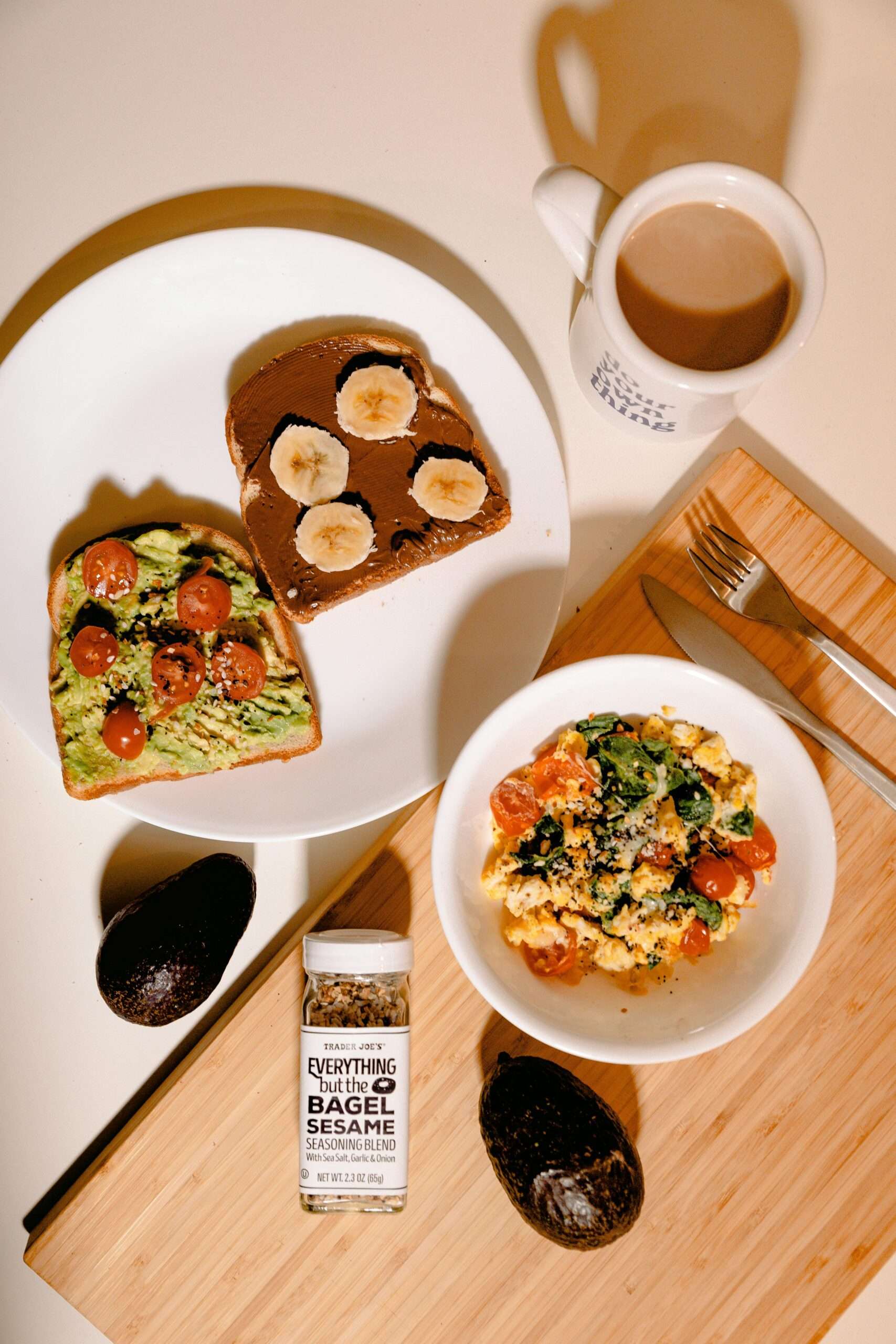Physical Address
304 North Cardinal St.
Dorchester Center, MA 02124
Physical Address
304 North Cardinal St.
Dorchester Center, MA 02124

Do you eat when you’re sad or depressed? Or maybe you eat until you’re extremely full? Perhaps it’s time to reset your relationship with food. In this article, I’ll share with you the types of unhealthy relationships with food, the reasons for a poor relationship with food, and 12 ways of repairing relationship with food. So, continue reading if you want to have a healthy relationship with food.
In order to have a healthy relationship with food, we must first identify the kind of poor relationship with food.
Emotional eating is using food to soothe feelings of stress, sadness, boredom, depression, etc. In other words, emotional eating is when a person uses food as a coping mechanism instead of addressing the issue when faced with discomfort. For example, eating a bowl of ice cream when you feel sad.
Binge eating is when a person consumes a lot of food until they overfull them self. It is also called compulsive eating. After binge eating, a person can feel guilt or shame because of lack of self-control. For instance, eating a whole box of pizza in one sitting until you’re uncomfortably full.
Refusing to eat a certain amount of food to maintain a body image or weight is called restrictive eating. People who eat restrictively are also called picky eaters. They are obsessed with calorie counting and would go as far as cutting a whole food group out of their diet. An example of restrictive eating is constantly checking your weight and eliminating a food group from your diet to maintain that weight.
Food phobia also known as Cibophobia is the fear of eating certain foods because of the thought of it being “unhealthy” or “unclean”. Food phobia correlates with another unhealthy relationship with food called Orthorexia which is obsessing over eating “clean” foods. An example of food phobia is the fear of eating chicken.
The Yo-yo diet is when someone constantly goes back and forth between a strict diet to overeating. This can cause the individual weight to fluctuate, causing them to gain and lose weight. As a result, this can leave the person physically and emotionally stressed. For instance if you go on restrictive diets, stop the diet, overeat, start to gain weight, and start the process over again is Yo-yo dieting.
Mindless eating is when a person is not considerate of their eating habits. They normally eat while multitasking or emotionally stressed. As a result, this can lead to unhealthy weight gain and even obesity. In addition, because these people aren’t aware of their eating habits, nor do they pay attention while eating, they tend to miss their body’s cue of telling them that they are full. For example eating while watching TV or on your phone.
Orthorexia is an addiction to someone eating “pure” or “clean” foods to the point where it causes stress and anxiety. In addition, people with Orthorexia focus on the quality rather than the quantity of the food. As a result, this can lead to nutritional deficiency. For example fixated on keeping a keto diet while blocking out the other food groups in your diet.
To heal relationship with food, we must understand the causes of a poor relationship with food.
Our society puts a lot of unrealistic expectations on us women especially when it comes to bodies. In our culture, we have to look a certain way for us to be seen as worthy.
For instance, having a slim figure is equivalent to being beautiful. Because of this, it can harm our mental health and we can even start to self-body shame.
Also, in society, we are taught that if we feel sad, we should eat a bowl of ice cream to feel better. This is connected to emotional eating.
All of this can cause us to have an unhealthy relationship with food.
Just like our society, social media puts unrealistic expectations on how we women should look and if we don’t look that way then we are considered less than (which is not true). Everyone’s body is different and should be celebrated.
Due to social media filters and the edification of photos on social media, many of us women think that our bodies should look like an ‘Ig model’.
As a result, we get this false sense of what our bodies should look like. This makes us more conscious about our bodies and creates anxiety and pressure within us.
Growing up, have your parents ever told you, “You’re not leaving this dining room table until you’ve finished your food”, although you feel full?
This can negatively affect how we sense cues from our bodies telling us when we’re full.

Mindful eating is paying close attention to your body’s cues letting you know when you’re hungry or full. Also, paying attention to the food you’re eating.
For example, noticing when you’re hungry and the texture and flavor of the food you’re eating.
Mindful eating prevents you from overeating, improves digestive health, and helps you to have a deep appreciation for food.
To practice mindful eating, slow down while eating to savor the texture and flavor of your meals and experience. Also, do not stuff yourself with food but know when you feel full and stop eating.
Repairing relationship with food requires addressing emotional eating. If you turn to food when you feel feelings of discomfort such as stress, depression, boredom, etc. Or turn to food to soothe your emotions rather than figure out the cause of it, you can come up with other coping mechanisms such as journaling, exercising, identifying the root of the problem, or meditating.

Planning and prepping your meals will not only save you time and money but also help you to eat intentionally by making healthier eating choices.
To plan your meals, you can use a planner or meal journal and jot down meals you want to eat throughout the week(make sure they are balanced meals).
In addition, prep your meals by cooking the food and placing them in bowls proportionately.
After all, food is a form of self-care, we eat it to nourish and fuel our bodies. So, don’t view food as an enemy or something bad but as a way to take care of your body.

There’s so much to enjoy when eating: the flavor, texture, and color of the food. Therefore, allow yourself to enjoy delicious mouth-watering dishes without feeling guilty. After all, food is a source of pleasure and makes up most of our culture around the world.
Putting bad and good labels on food can make you feel guilty or ashamed when it comes to certain foods. However, think of food as a fuel to nourish your body.

You can enjoy your cravings without overindulging, just eat moderately. As a matter of fact, depriving yourself of your cravings can lead to overindulging, therefore, learn how to balance your cravings.

A great way to figure out your eating patterns, habits, or triggers is by journaling. Journaling can make you reflect and become aware of your relationship with food. However, use your journal to bring self-awareness not to shame yourself.
Intuitive eating is eating based on how food makes your body feel instead of copying someone else’s diet or a popular diet. It is about connecting with your body by paying attention to what foods make you feel the best or the worst, what energizes you and what doesn’t.

To master our relationship with food we must first educate ourselves on it. Just learning the basics of food can go a long way when it comes to resetting our relationship with food.
To strengthen your relationship with food, a great place to start is learning the food groups such as protein, carbohydrates, etc., and how they support the health of your body.
As you can tell by now the core of resetting our relationship with food is being intuitive with our bodies. Therefore, paying attention to how certain foods make your body feel is important for healthier eating choices and diets that work for you.
So, the next time you eat ask yourself, “Does this food make me feel energized, fatigued, moody, etc?” This approach can make you have a healthier and improved relationship with food.

Cooking at home is healthier and can save you tons of money in the long run. When you cook at home, you are in control of the ingredients and proportions you use. Also, cooking your own meals can boost your confidence in the kitchen.
Change doesn’t happen overnight, therefore it takes time to see results. However, keep going and don’t take your small improvements for granted, appreciate them.
Instead of following people on social media who place unrealistic expectations on women, follow people who spread body positivity and healthy eating habits. Also, find people who are on the same journey as you for support and motivation.
Every day is not going to be a successful day or an easy day on your journey to resetting your relationship with food. However, strive for progress always and keep going.
Sometimes, some of us need that extra boost in support. There’s no shame in that. If you feel as though you need that extra support, seek help from a professional. That’s why they are here, to help us better our relationship with food.
So, if you feel as though you need that extra hand, consider booking an appointment with a registered dietitian or therapist specializing in eating behaviors.
Consider using these 12 ways for a healthy relationship with food. From practicing mindful eating to cooking at home often, you can be sure to restore your relationship with food in no time. So, what are you waiting for for? Start your journey to a healthier relationship with food today!
Hey there, before you go if this post has encouraged you to start your journey to repairing your relationship with food, like and share it with someone else it might help. Until next time, Ciao!